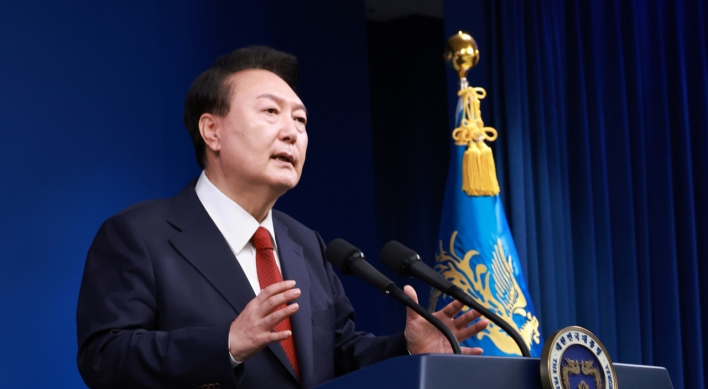Korea’s private conglomerates, domestically known as chaebol, are caught in the middle of policy confusion as they face tougher yet inconsistent regulations, while being urged to increase investments by the government.
The incumbent administration is asking the corporate sector to lead in increasing investments and employment this year amid economic uncertainties.
On the other hand, the big businesses are being targeted as part of economic democratization efforts for regulatory measures by agencies such as the Fair Trade Commission, the National Tax Service and the Board of Audit and Inspection.
These contrasting positions could lead to a business slowdown, market analysts said.
Trade, Industry and Energy Minister Yoon Sang-jick early this month thanked corporate executives from the top 30 companies for their plans to invest around 149 trillion won ($133 billion) this year in areas ranging from research and development to employment and equity investments.
Deputy Prime Minister Hyun Oh-seok followed this by meeting the heads of five business-interest or lobby groups Tuesday, requesting companies to invest and hire more, while suggesting a “partnership” between the government and the corporate sector.
Hyun also thanked the top 30 companies of their investment and employment plans in a meeting with the heads of the five business-interest groups.
Big companies, on the other side, are expected to be scrutinized and audited by state regulators over taxes and relations with their suppliers to ensure market fairness.
The antitrust regulator has been gearing up to monitor whether big companies pressured their suppliers to drop prices, or whether there were any malpractices of handing over most of industrial groups’ subcontracts to their subsidiaries owned by family members of chaebol.
This coincides with the latest findings by the state auditor, which urged for strengthened tax probes into conglomerates’ subcontract dealings with their family-run subsidiaries.
One of the prime examples that has been in the spotlight in regards to such relations is Hyundai Motor Group and Hyundai Glovis as the Korean auto giant owned by chairman Chung Mong-koo transferred most of its subcontract operations to its logistics subsidiary owned by Chung’s son Eui-sun.
The state auditor listed nine conglomerates including Hyundai Motor, SK and Lotte for the tax collecting agency to conduct stringent audits.
The Fair Trade Commission said there would be exceptions where subsidiaries can outsource for their parent or family-run groups.
For instance, subsidiaries can deliver their supplies to their parent companies if it can improve the latter’s cost efficiency and product quality, or if it concerns advanced technology that needs to be kept under wraps from competitors.
Deputy Prime Minister Hyun said that the government’s economic democratization policy is not to hinder businesses, but aimed at promoting a “creative economy.”
“Economic democratization is to encourage fair play and support a creative economy,” said Hyun, who is also the finance minister.
He added that expanded tax probes are primarily to achieve justice in taxation not to block business growth.
By Park Hyong-ki (hkp@heraldcorp.com)
The incumbent administration is asking the corporate sector to lead in increasing investments and employment this year amid economic uncertainties.
On the other hand, the big businesses are being targeted as part of economic democratization efforts for regulatory measures by agencies such as the Fair Trade Commission, the National Tax Service and the Board of Audit and Inspection.
These contrasting positions could lead to a business slowdown, market analysts said.
Trade, Industry and Energy Minister Yoon Sang-jick early this month thanked corporate executives from the top 30 companies for their plans to invest around 149 trillion won ($133 billion) this year in areas ranging from research and development to employment and equity investments.
Deputy Prime Minister Hyun Oh-seok followed this by meeting the heads of five business-interest or lobby groups Tuesday, requesting companies to invest and hire more, while suggesting a “partnership” between the government and the corporate sector.
Hyun also thanked the top 30 companies of their investment and employment plans in a meeting with the heads of the five business-interest groups.
Big companies, on the other side, are expected to be scrutinized and audited by state regulators over taxes and relations with their suppliers to ensure market fairness.
The antitrust regulator has been gearing up to monitor whether big companies pressured their suppliers to drop prices, or whether there were any malpractices of handing over most of industrial groups’ subcontracts to their subsidiaries owned by family members of chaebol.
This coincides with the latest findings by the state auditor, which urged for strengthened tax probes into conglomerates’ subcontract dealings with their family-run subsidiaries.
One of the prime examples that has been in the spotlight in regards to such relations is Hyundai Motor Group and Hyundai Glovis as the Korean auto giant owned by chairman Chung Mong-koo transferred most of its subcontract operations to its logistics subsidiary owned by Chung’s son Eui-sun.
The state auditor listed nine conglomerates including Hyundai Motor, SK and Lotte for the tax collecting agency to conduct stringent audits.
The Fair Trade Commission said there would be exceptions where subsidiaries can outsource for their parent or family-run groups.
For instance, subsidiaries can deliver their supplies to their parent companies if it can improve the latter’s cost efficiency and product quality, or if it concerns advanced technology that needs to be kept under wraps from competitors.
Deputy Prime Minister Hyun said that the government’s economic democratization policy is not to hinder businesses, but aimed at promoting a “creative economy.”
“Economic democratization is to encourage fair play and support a creative economy,” said Hyun, who is also the finance minister.
He added that expanded tax probes are primarily to achieve justice in taxation not to block business growth.
By Park Hyong-ki (hkp@heraldcorp.com)








![[KH Explains] Can tech firms' AI alliances take on Nvidia?](http://res.heraldm.com/phpwas/restmb_idxmake.php?idx=644&simg=/content/image/2024/05/07/20240507050619_0.jpg&u=)








![[K-pop’s dilemma] Time, profit pressures work against originality](http://res.heraldm.com/phpwas/restmb_idxmake.php?idx=652&simg=/content/image/2024/05/08/20240508050705_0.jpg&u=20240508171126)
![[K-pop’s dilemma] Can K-pop break free from ‘fandom’ model?](http://res.heraldm.com/phpwas/restmb_idxmake.php?idx=642&simg=/content/image/2024/05/09/20240509050541_0.jpg&u=)